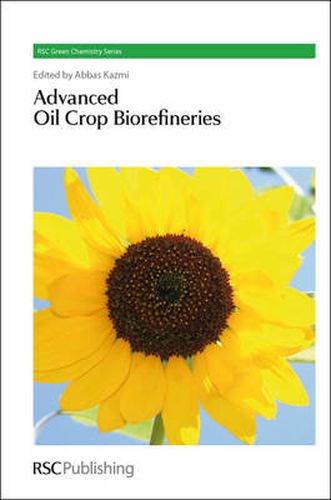Readings Newsletter
Become a Readings Member to make your shopping experience even easier.
Sign in or sign up for free!
You’re not far away from qualifying for FREE standard shipping within Australia
You’ve qualified for FREE standard shipping within Australia
The cart is loading…






In Europe, the main oil-rich crops are sunflower, rapeseed and olive which are grown primarily for food. This book discusses how to convert this whole crop into energy (fuels, power and heat), food and bioproducts (chemicals and/or materials), whilst making optimal use of the by-products generated during farming/harvesting, primary processing (oil extraction and refining) and secondary processing (transesterification). The resulting processes are more economically competitive and the business margin for oil and biodiesel manufacturers is improved. Previously, oil crops have been the main point of focus but many of the technologies used are applicable to a wide variety of raw materials. For example, cellulose from rapeseed straw can be converted to levulinic acid but the same technology could be applied to cellulose from wheat straw or wood. Significant effort is now being devoted to ‘2nd generation’ raw materials such as ligno-cellulose which avoid direct competition with food sources. This volume integrates these developments with existing plant oil supply chains and combines biochemical and thermochemical processes to form integrated biorefinery schemes. Two unique features of the book are the information on LCA of biorefinery schemes and the surveys showing where traditional industries could be affected by new biorefinery developments. Energy and cost calculations for the key biorefinery processes and are also included revealing that some are surprisingly profitable and could offer significant global benefits. Other topics covered include: novel farming and harvesting methods, efficient extraction of plant oils, producing biodiesel without glycerol, extraction of high value chemicals from agricultural by-products, anaerobic digestion potential of agricultural by-products, use of proteins to yield amino acids, economics and life cycle analysis, stakeholder surveys, and policy scenarios. The book is of interest to academics working in relevant areas of chemistry, biology, materials, engineering, economics and policy studies. Those working in the EU farming industry will also find it relevant to their business.
$9.00 standard shipping within Australia
FREE standard shipping within Australia for orders over $100.00
Express & International shipping calculated at checkout
In Europe, the main oil-rich crops are sunflower, rapeseed and olive which are grown primarily for food. This book discusses how to convert this whole crop into energy (fuels, power and heat), food and bioproducts (chemicals and/or materials), whilst making optimal use of the by-products generated during farming/harvesting, primary processing (oil extraction and refining) and secondary processing (transesterification). The resulting processes are more economically competitive and the business margin for oil and biodiesel manufacturers is improved. Previously, oil crops have been the main point of focus but many of the technologies used are applicable to a wide variety of raw materials. For example, cellulose from rapeseed straw can be converted to levulinic acid but the same technology could be applied to cellulose from wheat straw or wood. Significant effort is now being devoted to ‘2nd generation’ raw materials such as ligno-cellulose which avoid direct competition with food sources. This volume integrates these developments with existing plant oil supply chains and combines biochemical and thermochemical processes to form integrated biorefinery schemes. Two unique features of the book are the information on LCA of biorefinery schemes and the surveys showing where traditional industries could be affected by new biorefinery developments. Energy and cost calculations for the key biorefinery processes and are also included revealing that some are surprisingly profitable and could offer significant global benefits. Other topics covered include: novel farming and harvesting methods, efficient extraction of plant oils, producing biodiesel without glycerol, extraction of high value chemicals from agricultural by-products, anaerobic digestion potential of agricultural by-products, use of proteins to yield amino acids, economics and life cycle analysis, stakeholder surveys, and policy scenarios. The book is of interest to academics working in relevant areas of chemistry, biology, materials, engineering, economics and policy studies. Those working in the EU farming industry will also find it relevant to their business.